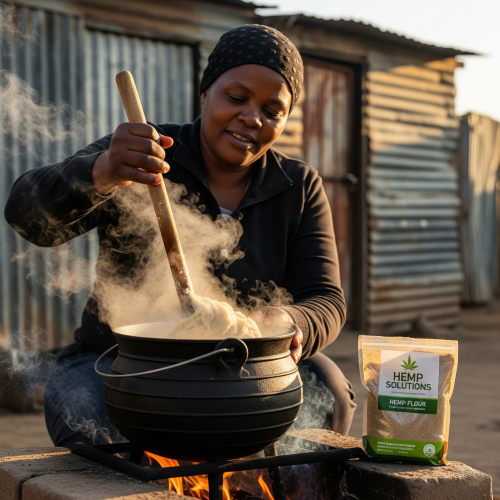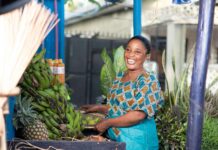In a world facing unprecedented climate challenges and the pressing need for sustainable development, a Hemp revolution is taking place across Africa. The global industrial hemp market is experiencing explosive growth, projected to surge from US$ 5.4 billion and US$19.7 billion by 2032. For African smallholder farmers, this is not just a global trend; it is an opportunity to farm a more resilient, profitable, and equitable crop.
For too long, the immense potential of this versatile plant has been overshadowed by regulatory hurdles. However, as nations across the continent, from to Ghana re-evaluate their agricultural policies, industrial hemp is emerging as a cornerstone of modern agribusiness. It is the ideal crop in the 21st century as it is the only product in the world that can feed you, clothe you, transport you, house you while also sequestering CO2 writes Dr. Johan Jacobs, CEO of Hemp Solutions.
The Economics of Empowerment
One of the most compelling arguments for industrial hemp lies in its economic potential for small-scale farmers. As a low-input crop, it requires minimal pesticides and fertilizers, significantly reducing cultivation costs. The plant’s grain can be cold-pressed for nutritious oil and protein-rich flour, while its stalks yield a strong, durable fiber for textiles, paper, and composites. These multiple applications offer a much-needed buffer against market volatility and provide farmers with diversified income streams.
Hemp’s cultivation also holds the key to significant job creation, particularly in rural areas where it is needed most. The commercialization of industrial hemp could lead to the creation of tens of thousands of jobs in South Africa alone, with estimates as high as 130,000 across the entire value chain. This is not just about farming; it’s about establishing entire processing, manufacturing, and marketing industries that will transform rural economies. Hemp Solutions is actively working to establish these value chains, ensuring that the benefits of this new industry are felt directly at the community level.
A Crop for a Changing Climate
For Africa’s farmers, climate change is not a future threat but a present reality. Industrial hemp stands out as a climate-smart crop uniquely suited to tackle these challenges. It requires significantly less water than other major crops like cotton, making it a viable and sustainable alternative in water-scarce and drought-prone regions.
Furthermore, hemp is a phytoremediation powerhouse, capable of absorbing heavy metals and toxins from contaminated soil. This makes it an invaluable tool for rehabilitating degraded land, helping to restore soil health and prepare it for future food production. Perhaps most remarkably, industrial hemp is a highly efficient carbon sink, absorbing large amounts of CO2 from the atmosphere as it grows. By adopting hemp farming, smallholders can contribute directly to national climate action plans, positioning Africa as a leader in regenerative agriculture. The team at Hemp Solutions is dedicated to educating farmers on these environmental benefits and promoting hemp’s role in a greener future.
African Success Stories
The narrative of industrial hemp in Africa is not a distant dream; it is an unfolding reality. Nations across the continent are leading the way with bold policy reforms and innovative projects. In Ghana, for instance, the HEMPTECH Conference has become a catalyst for policy, research, and international trade, expanding partnerships across the ECOWAS region. In Zimbabwe and Lesotho, hemp is being positioned as a valuable export crop. In Botswana, a recent approvals by parliament marks the start of a potential new economy.
In South Africa, where hemp has been reclassified as an agricultural crop, a clear path has been laid for commercial cultivation and processing. “Africa is on the verge of a hemp-led agricultural renaissance,” says Dr. Johan Jacobs, CEO of Hemp Solutions. “We are seeing a groundswell of interest from smallholder farmers who want to be part of a sustainable, profitable, and empowering future. Our mission at Hemp Solutions is to provide them with the knowledge and resources to make that happen.”
To address the barrier of limited processing facilities, a common challenge in many regions, farmers can start on a smaller scale. Hemp Solutions is championing the development of multiple accessible, low-tech solutions. Farmers can also focus on producing hemp fiber for local artisans and textile manufacturers, creating a cottage industry that builds on traditional skills. This approach ensures that the benefits of industrial hemp are immediately accessible and not contingent on large-scale, distant infrastructure.
Overcoming the Hurdles
While the future is bright, it is not without its challenges. The slow pace of legislative reform in some countries remains a hurdle, often creating uncertainty for potential investors and farmers. The lack of clear national standards for THC content and cultivation practices can also be a deterrent.
However, these challenges are being met with determined solutions. The ongoing dialogue between farmers, policymakers, and industry leaders is crucial. Organizations like Hemp Solutions are at the forefront of this advocacy, working tirelessly to streamline regulations and provide farmers with the legal certainty they need to invest in this crop with confidence. By collaborating, stakeholders can build a robust, ethical, and fully regulated industry that protects both the farmer and the end consumer.
Industrial hemp offers Africa a powerful and multifaceted solution to some of its most pressing agricultural challenges. It is a crop that promises not only economic prosperity and rural job creation but also a more sustainable and climate-resilient farming future. From the soil-enriching properties of its roots to the countless applications of its fiber and seeds, hemp provides a blueprint for an agricultural model that is both profitable and environmentally responsible. It is time for African farmers, with the support of pioneering companies like Hemp Solutions, to embrace this opportunity and cultivate a new era of growth and empowerment. The future of African agriculture is green, and it has deep roots in industrial hemp.
- Dr. Johan Jacobs
- HEMP SOLUTIONS (PTY) LTD.
- Paarl, Western Cape, South Africa
- Mobile: +27 82 552 5852
- Web: www.hempsolutions.co.za
- e-Mail: johan.jacobs@HempSolutions.co.za








